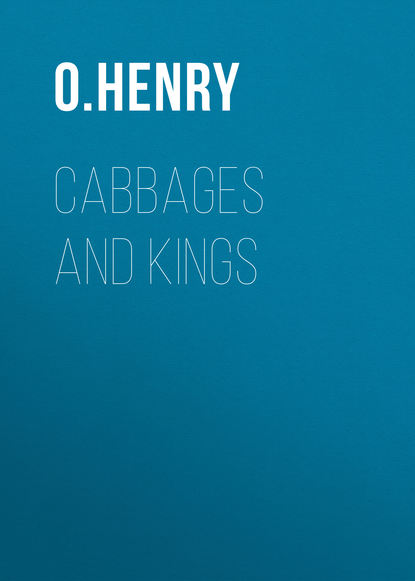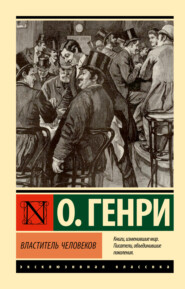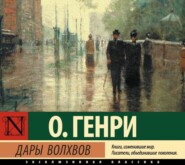По всем вопросам обращайтесь на: info@litportal.ru
(©) 2003-2025.
✖
Cabbages and Kings
Настройки чтения
Размер шрифта
Высота строк
Поля
"Americano," growled Goodwin, without turning his head, and passed on, unhalted.
To the right he turned, and to the left up the street that ultimately reached the Plaza Nacional. When within the toss of a cigar stump from the intersecting Street of the Holy Sepulchre, he stopped suddenly in the pathway.
He saw the form of a tall man, clothed in black and carrying a large valise, hurry down the cross-street in the direction of the beach. And Goodwin's second glance made him aware of a woman at the man's elbow on the farther side, who seemed to urge forward, if not even to assist, her companion in their swift but silent progress. They were no Coralians, those two.
Goodwin followed at increased speed, but without any of the artful tactics that are so dear to the heart of the sleuth. The American was too broad to feel the instinct of the detective. He stood as an agent for the people of Anchuria, and but for political reasons he would have demanded then and there the money. It was the design of his party to secure the imperilled fund, to restore it to the treasury of the country, and to declare itself in power without bloodshed or resistance.
The couple halted at the door of the Hotel de los Estranjeros, and the man struck upon the wood with the impatience of one unused to his entry being stayed. Madama was long in response; but after a time her light showed, the door was opened, and the guests housed.
Goodwin stood in the quiet street, lighting another cigar. In two minutes a faint gleam began to show between the slats of the jalousies in the upper story of the hotel. "They have engaged rooms," said Goodwin to himself. "So, then, their arrangements for sailing have yet to be made."
At that moment there came along one Estebán Delgado, a barber, an enemy to existing government, a jovial plotter against stagnation in any form. This barber was one of Coralio's saddest dogs, often remaining out of doors as late as eleven, post meridian. He was a partisan Liberal; and he greeted Goodwin with flatulent importance as a brother in the cause. But he had something important to tell.
"What think you, Don Frank!" he cried, in the universal tone of the conspirator. "I have to-night shaved la barba– what you call the 'weeskers' of the Presidente himself, of this countree! Consider! He sent for me to come. In the poor casita of an old woman he awaited me – in a verree leetle house in a dark place. Carramba!– el Señor Presidente to make himself thus secret and obscured! I think he desired not to be known – but, carajo! can you shave a man and not see his face? This gold piece he gave me, and said it was to be all quite still. I think, Don Frank, there is what you call a chip over the bug."
"Have you ever seen President Miraflores before?" asked Goodwin.
"But once," answered Estebán. "He is tall; and he had weeskers, verree black and sufficient."
"Was anyone else present when you shaved him?"
"An old Indian woman, Señor, that belonged with the casa, and one señorita – a ladee of so much beautee! —ah, Dios!"
"All right, Estebán," said Goodwin. "It's very lucky that you happened along with your tonsorial information. The new administration will be likely to remember you for this."
Then in a few words he made the barber acquainted with the crisis into which the affairs of the nation had culminated, and instructed him to remain outside, keeping watch upon the two sides of the hotel that looked upon the street, and observing whether anyone should attempt to leave the house by any door or window. Goodwin himself went to the door through which the guests had entered, opened it and stepped inside.
Madama had returned downstairs from her journey above to see after the comfort of her lodgers. Her candle stood upon the bar. She was about to take a thimbleful of rum as a solace for having her rest disturbed. She looked up without surprise or alarm as her third caller entered.
"Ah! it is the Señor Goodwin. Not often does he honour my poor house by his presence."
"I must come oftener," said Goodwin, with the Goodwin smile. "I hear that your cognac is the best between Belize to the north and Rio to the south. Set out the bottle, Madama, and let us have the proof in un vasito for each of us."
"My aguardiente," said Madama, with pride, "is the best. It grows, in beautiful bottles, in the dark places among the banana-trees. Si, Señor. Only at midnight can they be picked by sailor-men who bring them, before daylight comes, to your back door. Good aguardiente is a verree difficult fruit to handle, Señor Goodwin."
Smuggling, in Coralio, was much nearer than competition to being the life of trade. One spoke of it slyly, yet with a certain conceit, when it had been well accomplished.
"You have guests in the house to-night," said Goodwin, laying a silver dollar upon the counter.
"Why not?" said Madama, counting the change. "Two; but the smallest while finished to arrive. One señor, not quite old, and one señorita of sufficient handsomeness. To their rooms they have ascended, not desiring the to-eat nor the to-drink. Two rooms —Numero 9 and Numero 10."
"I was expecting that gentleman and that lady," said Goodwin. "I have important negocios that must be transacted. Will you allow me to see them?"
"Why not?" sighed Madama, placidly. "Why should not Señor Goodwin ascend and speak to his friends? Está bueno. Room Numero 9 and room Numero 10."
Goodwin loosened in his coat pocket the American revolver that he carried, and ascended the steep, dark stairway.
In the hallway above, the saffron light from a hanging lamp allowed him to select the gaudy numbers on the doors. He turned the knob of Number 9, entered and closed the door behind him.
If that was Isabel Guilbert seated by the table in that poorly furnished room, report had failed to do her charms justice. She rested her head upon one hand. Extreme fatigue was signified in every line of her figure; and upon her countenance a deep perplexity was written. Her eyes were gray-irised, and of that mould that seems to have belonged to the orbs of all the famous queens of hearts. Their whites were singularly clear and brilliant, concealed above the irises by heavy horizontal lids, and showing a snowy line below them. Such eyes denote great nobility, vigour, and, if you can conceive of it, a most generous selfishness. She looked up when the American entered with an expression of surprised inquiry, but without alarm.
Goodwin took off his hat and seated himself, with his characteristic deliberate ease, upon a corner of the table. He held a lighted cigar between his fingers. He took this familiar course because he was sure that preliminaries would be wasted upon Miss Guilbert. He knew her history, and the small part that the conventions had played in it.
"Good evening," he said. "Now, madame, let us come to business at once. You will observe that I mention no names, but I know who is in the next room, and what he carries in that valise. That is the point which brings me here. I have come to dictate terms of surrender."
The lady neither moved nor replied, but steadily regarded the cigar in Goodwin's hand.
"We," continued the dictator, thoughtfully regarding the neat buckskin shoe on his gently swinging foot – "I speak for a considerable majority of the people – demand the return of the stolen funds belonging to them. Our terms go very little further than that. They are very simple. As an accredited spokesman, I promise that our interference will cease if they are accepted. Give up the money, and you and your companion will be permitted to proceed wherever you will. In fact, assistance will be given you in the matter of securing a passage by any outgoing vessel you may choose. It is on my personal responsibility that I add congratulations to the gentleman in Number 10 upon his taste in feminine charms."
Returning his cigar to his mouth, Goodwin observed her, and saw that her eyes followed it and rested upon it with icy and significant concentration. Apparently she had not heard a word he had said. He understood, tossed the cigar out the window, and, with an amused laugh, slid from the table to his feet.
"That is better," said the lady. "It makes it possible for me to listen to you. For a second lesson in good manners, you might now tell me by whom I am being insulted."
"I am sorry," said Goodwin, leaning one hand on the table, "that my time is too brief for devoting much of it to a course of etiquette. Come, now; I appeal to your good sense. You have shown yourself, in more than one instance, to be well aware of what is to your advantage. This is an occasion that demands the exercise of your undoubted intelligence. There is no mystery here. I am Frank Goodwin; and I have come for the money. I entered this room at a venture. Had I entered the other I would have had it before now. Do you want it in words? The gentleman in Number 10 has betrayed a great trust. He has robbed his people of a large sum, and it is I who will prevent their losing it. I do not say who that gentleman is; but if I should be forced to see him and he should prove to be a certain high official of the republic, it will be my duty to arrest him. The house is guarded. I am offering you liberal terms. It is not absolutely necessary that I confer personally with the gentleman in the next room. Bring me the valise containing the money, and we will call the affair ended."
The lady arose from her chair and stood for a moment, thinking deeply.
"Do you live here, Mr. Goodwin?" she asked, presently.
"Yes."
"What is your authority for this intrusion?"
"I am an instrument of the republic. I was advised by wire of the movements of the – gentleman in Number 10."
"May I ask you two or three questions? I believe you to be a man more apt to be truthful than – timid. What sort of a town is this – Coralio, I think they call it?"
"Not much of a town," said Goodwin, smiling. "A banana town, as they run. Grass huts, 'dobes, five or six two-story houses, accommodations limited, population half-breed Spanish and Indian, Caribs and blackamoors. No sidewalks to speak of, no amusements. Rather unmoral. That's an offhand sketch, of course."
"Are there any inducements, say in a social or in a business way, for people to reside here?"
"Oh, yes," answered Goodwin, smiling broadly. "There are no afternoon teas, no hand-organs, no department stores – and there is no extradition treaty."
"He told me," went on the lady, speaking as if to herself, and with a slight frown, "that there were towns on this coast of beauty and importance; that there was a pleasing social order – especially an American colony of cultured residents."
"There is an American colony," said Goodwin, gazing at her in some wonder. "Some of the members are all right. Some are fugitives from justice from the States. I recall two exiled bank presidents, one army paymaster under a cloud, a couple of manslayers, and a widow – arsenic, I believe, was the suspicion in her case. I myself complete the colony, but, as yet, I have not distinguished myself by any particular crime."
"Do not lose hope," said the lady, dryly; "I see nothing in your actions to-night to guarantee you further obscurity. Some mistake has been made; I do not know just where. But him you shall not disturb to-night. The journey has fatigued him so that he has fallen asleep, I think, in his clothes. You talk of stolen money! I do not understand you. Some mistake has been made. I will convince you. Remain where you are and I will bring you the valise that you seem to covet so, and show it to you."
She moved toward the closed door that connected the two rooms, but stopped, and half turned and bestowed upon Goodwin a grave, searching look that ended in a quizzical smile.
"You force my door," she said, "and you follow your ruffianly behaviour with the basest accusations; and yet" – she hesitated, as if to reconsider what she was about to say – "and yet – it is a puzzling thing – I am sure there has been some mistake."
She took a step toward the door, but Goodwin stayed her by a light touch upon her arm. I have said before that women turned to look at him in the streets. He was the viking sort of man, big, good-looking, and with an air of kindly truculence. She was dark and proud, glowing or pale as her mood moved her. I do not know if Eve were light or dark, but if such a woman had stood in the garden I know that the apple would have been eaten. This woman was to be Goodwin's fate, and he did not know it; but he must have felt the first throes of destiny, for, as he faced her, the knowledge of what report named her turned bitter in his throat.
"If there has been any mistake," he said, hotly, "it was yours. I do not blame the man who has lost his country, his honour, and is about to lose the poor consolation of his stolen riches as much as I blame you, for, by Heaven! I can very well see how he was brought to it. I can understand, and pity him. It is such women as you that strew this degraded coast with wretched exiles, that make men forget their trusts, that drag – "
The lady interrupted him with a weary gesture.

















